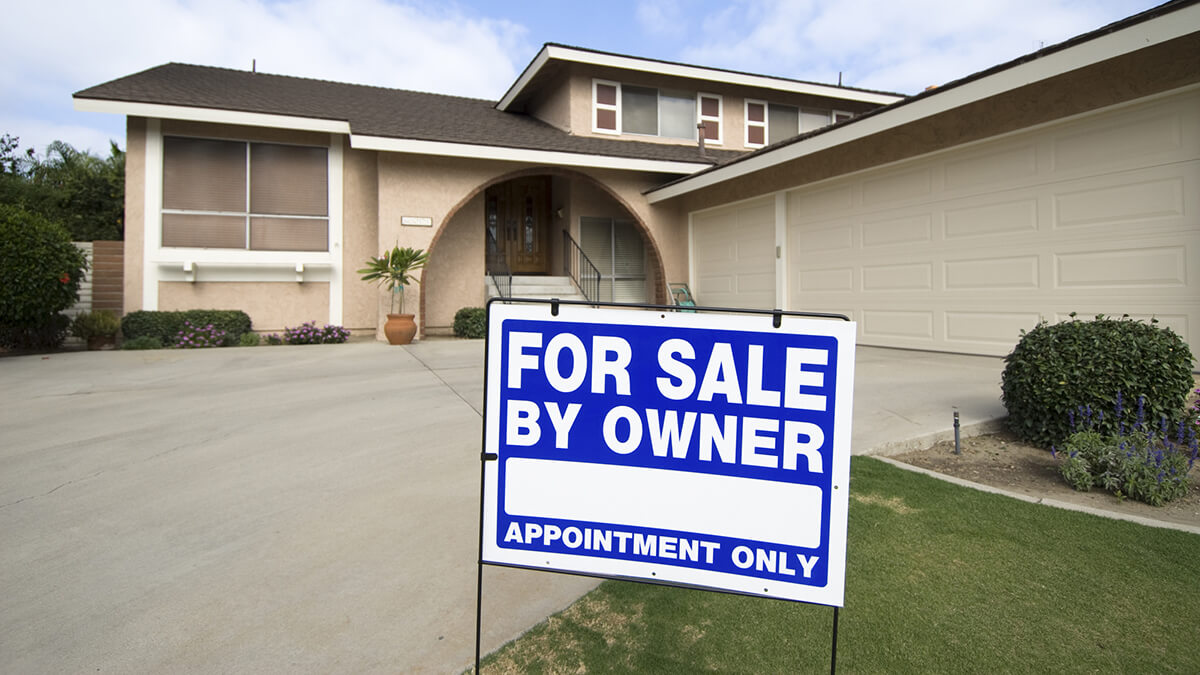Selling your house without a Realtor might feel intimidating, but it’s more common, and more manageable, than you might think. Whether you’re hoping to save on commission fees or simply want more control over the process, going the “for sale by owner” route can work well with the right preparation. Selling your home without an agent means taking on more work yourself, but the payoff can be worth it.
And if you’re looking for the simplest way to sell? You can always get a data-backed cash offer from iBuyer.com and choose your close date, no listings or showings required.
Table of contents
- Should You Sell Your House Without a Realtor? (Pros and Cons)
- Your Selling Options Without Hiring a Real Estate Agent
- How to Price Your Home Right (And Why It Matters)
- How to Prepare and List Your Home Without an Agent
- Navigating Real Estate Paperwork and Legal Requirements
- What to Expect During the Selling Process
- Reilly’s Two Cents
- You Can Sell Without a Realtor, Just Be Smart About It
- Frequently Asked Questions
Instant Valuation, Confidential Deals with a Certified iBuyer.com Specialist.
Sell Smart, Sell Fast, Get Sold. No Obligations.
Should You Sell Your House Without a Realtor? (Pros and Cons)
Selling without a real estate agent has its perks, but it’s not the best choice for everyone. Let’s break down the key pros and cons so you can decide what fits your situation best.
Pros:
- Save on commission fees. You won’t pay a listing agent, which can save you thousands.
- More control. You decide on the price, timing, and how your home is marketed.
- Direct communication. You talk directly with potential buyers, making negotiations faster.
Cons:
- You may miss out on a higher sale price. Without expert pricing or marketing, your home might sell for less.
- Handling all the paperwork. The legal side of real estate can be tricky.
- You’ll do all the work. From staging to scheduling tours, it’s all on you.
Your Selling Options Without Hiring a Real Estate Agent
There’s no one-size-fits-all when it comes to selling your home without a Realtor. Below are three common approaches, each with its own pros, challenges, and ideal situations.
Sell Your House For Sale By Owner (FSBO)
With FSBO, you take full control of the entire selling process. That means you’ll set the price, list the home, market it, schedule showings, handle offers, and manage closing paperwork. It can be a great way to save on listing agent fees and stay involved every step of the way. But it also means wearing many hats, and it helps to be organized and comfortable with details.
Sell to a Cash Buyer
If your top priority is speed and simplicity, selling to a cash buyer might be the best fit. These buyers, often investors, usually purchase homes as-is, with no need for repairs or staging. You can often close in just a few days. The trade-off? Cash offers are typically lower than what you’d get on the open market, so it might not be ideal if you’re aiming for top dollar.
Work with a Real Estate Attorney
Some sellers choose to work with a real estate attorney instead of an agent. This can be a smart middle-ground option, especially if you’re confident in showing and negotiating but want help with the legal paperwork. Attorneys can draft your purchase agreement, review disclosures, and make sure everything is filed properly. You’ll pay a fee for their services, but it’s usually less than a full agent’s commission.
How to Price Your Home Right (And Why It Matters)
One of the biggest mistakes home sellers make is pricing too high, or too low. Getting the price right from the start helps attract serious buyers and can lead to a quicker, smoother sale.
Start with a market analysis. Look at recently sold homes in your area that are similar in size, condition, and features. These are called comps, and they give you a good idea of what buyers are willing to pay.
You can also:
- Use online home value tools for a ballpark figure.
- Hire an appraiser for a professional opinion.
- Drive around your neighborhood to compare active listings.
Remember, the goal is to land at a sale price that feels fair to both you and the buyer, not just to list high and hope for a miracle. The right price draws in more potential buyers, reduces time on market, and helps you avoid price cuts later on.
How to Prepare and List Your Home Without an Agent
Selling without a Realtor means you’re in charge of getting your home ready and out in front of buyers. Here’s how to do it:
Step 1: Clean and Declutter
Start with a deep clean, floors, windows, kitchens, bathrooms, everything. Clear off counters and pack away personal items so buyers can picture themselves living there.
Step 2: Make Minor Repairs
Fix anything broken or worn out. Tighten cabinet handles, replace light bulbs, and patch up any holes in the wall. These little fixes help your home feel move-in ready.
Step 3: Stage Your Home
Rearrange furniture to open up rooms. Use neutral colors and remove anything that feels too personal. A tidy, well-staged home looks bigger and brighter.
Step 4: Take Great Photos
Photos are what sell the showing. If you can, hire a professional photographer, they know how to make your home stand out online. If not, use a good phone camera and take pics in natural light.
Step 5: Write and Post Your Listing
Use a flat-fee MLS service to list your home online. These services get your listing on big sites like Zillow and Realtor.com without paying a full commission. Write a clear, honest description and highlight your home’s best features.
Step 6: Spread the Word
Share your listing on social media, local groups, and FSBO websites. Email friends and family. The more eyeballs on your listing, the better your chances of finding a buyer fast.
Navigating Real Estate Paperwork and Legal Requirements
When you sell without an agent, you’re also the one in charge of the paperwork. It might sound scary, but with a little prep, you can stay on top of it. Be sure to complete all required disclosures truthfully
Here are the key documents most home sellers need:
- Seller Disclosure Form: This tells buyers about known problems with the home, like a leaky roof or old wiring. Being upfront protects you from legal trouble later.
- Purchase Agreement: This contract lays out the terms of the sale, like the price, closing date, and any repairs agreed upon.
- Title Report and Deed: You’ll need to prove you own the home and can legally sell it. The title company helps handle this part.
- Closing Documents: These include forms for taxes, mortgage payoff, and final signatures. A closing agent or real estate attorney can walk you through them.
- Other Documents: Depending on your location, you might also need HOA rules, utility bills, warranties, or permits for past repairs.
This is where many sellers bring in a real estate attorney, even just for a flat-fee review. They can make sure you’re covered legally without the cost of a full-service agent.
What to Expect During the Selling Process
Once your home is listed, it’s time to roll up your sleeves. Here’s what usually happens next:
- Buyers start reaching out. Be ready to answer questions and schedule showings. Some might ask to come the same day, so try to stay flexible.
- You’ll get offers (hopefully more than one). Review each one carefully, don’t just look at the sale price. Consider things like financing, contingencies, and timing.
- Negotiate the terms. You can counteroffer on price, ask for a faster close, or request fewer contingencies. This is where it helps to understand basic real estate transactions.
- Inspections and appraisals happen next. Most buyers will hire a home inspector, and if they’re using a loan, their lender will require an appraisal. Be prepared for repair requests.
- You’ll handle closing paperwork. This includes finalizing contracts, settling closing costs, and transferring the title. A closing agent or attorney will guide you through it, but you’re still the one responsible for signing off.
Each part of the process matters, and staying organized can help you avoid delays or surprises.
Reilly’s Two Cents
I’ve worked with plenty of sellers who wanted to go it alone, and honestly, I get it. Sometimes you just want to take charge, save money, and keep things simple. While my experience is rooted in Florida, many of the basics still apply no matter where you’re selling.
Here’s what I’ve seen work best, and where folks often trip up.
1. Know your limits. You might be great at marketing, but not so great at legal stuff. That’s okay, bring in a professional for just that part. You don’t have to go 100% solo to still save big.
2. Screen buyers carefully. Always ask for pre-approval letters or proof of funds before showing your home. It weeds out window shoppers and protects your time.
3. Don’t skip the fine print. Whether it’s an offer or a final contract, read every word. If you’re not sure about something, pause and get help. One missed clause can cost you thousands.
4. Stick to your price, but stay realistic. It’s tempting to aim high, but overpricing often backfires. Buyers are doing their homework too. Meet the market where it’s at.
5. Have a backup plan. If FSBO isn’t getting traction after a few weeks, don’t be afraid to pivot, maybe to a flat-fee agent or even a cash offer. The goal is to sell smart, not stubborn.
Selling your home without an agent can absolutely work, but doing it right means treating it like a real job. Put in the effort, ask for help where you need it, and don’t rush through the serious stuff.
You Can Sell Without a Realtor, Just Be Smart About It
Selling your home on your own takes planning, patience, and a willingness to learn. But if you’re clear on your goals and stay organized, it can be a smart, rewarding move. From pricing and marketing to paperwork and closing, every step is doable when you know what to expect.
Want to skip the stress and sell faster? Get your data-backed cash offer from iBuyer.com today, no listings, no showings, just a smooth close on your terms.
Compare Cash Offers from Top Home Buyers. Delivered by Your Local iBuyer Certified Specialist.
One Expert, Multiple Offers, No Obligation.
Frequently Asked Questions
Most sellers need a disclosure form, purchase agreement, and a deed. You may also need utility bills, HOA docs, or permits depending on your area.
Yes, in every state. Just make sure you follow local laws, especially when it comes to disclosures and contracts.
Overpricing. Sellers often aim too high, which can lead to fewer showings and price cuts later on.
No, but many buyers work with agents. Offering a small commission can help attract more potential buyers.
Compare recent sales (comps) in your neighborhood. You can also use online tools or pay for an appraisal to be sure.
Reilly Dzurick is a seasoned real estate agent at Get Land Florida, bringing over six years of industry experience to the vibrant Vero Beach market. She is known for her deep understanding of local real estate trends and her dedication to helping clients find their dream properties. Reilly’s journey in real estate is complemented by her academic background in Public Relations, Advertising, and Applied Communication from the University of North Florida.




